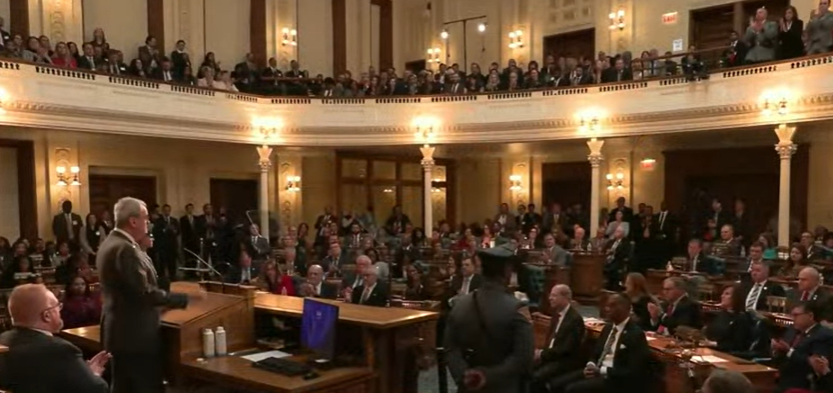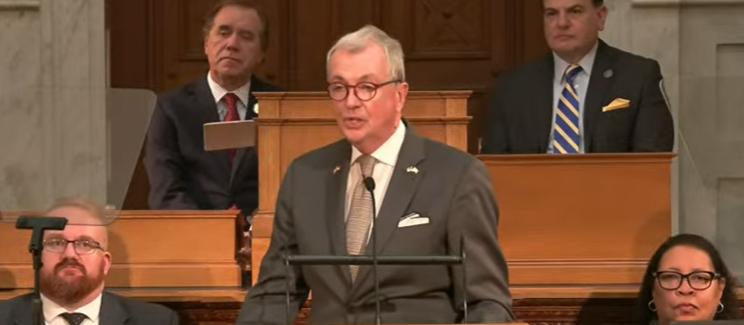TRENTON – Amid national political volatility, to put it mildly, $1.4 billion bigger than 2025, with a billion- dollar’s-worth of new taxes, all added up, and lacking dramatic long-term structural repairs as revenue collections lag behind the year-end target – but avoiding broad-based hurt – Governor Phil Murphy’s proposed 2026 Fiscal Year Budget – $58.1 billion – this afternoon landed with a somewhat wearying thud in the joint legislative chamber.
“Over the last seven plus years we have begun building a New Jersey stronger and more prepared for the future,” said the governor, in this, his last budget address as he wraps two terms in office with this year’s record-setting behemoth, which includes a full $7.2 billion pension payment, and $2.4 billion for the state’s ANCHOR program.

“But we have not reached the finish line yet,” Murphy added, throwing a loose elbow at Washington D.C. as he referenced “the chaos and confusion in Washington, louder than ever,” where Elon Musk literally brandishes a chainsaw as he slashes government programs.
“We need to keep fighting with every fiber of our being,” Murphy said. “I’m not done yet, and we’re not

done yet.”
Former Governors Jon Corzine and James McGreevey sat in the crowd listening to their same-party successor. The high cost of living represents the single biggest challenge facing New Jerseyans, observed the millionaire sitting governor.
The proposed budget would park the state at the end of Murphy’s second term with a $6.3 billion surplus, and dedicate $4.3 billion in direct property tax relief, including the Election Year-aware StayNJ program.
“Back on the road toward balance,” said the governor.
To those who he knows will trash the proposed budget based on its record-setting size, the governor wanted to know, “What would you cut?”
More from John Reitmeyer of NJ Spotlight News:
The governor’s budget plan “counts on the state collecting more money from a series of proposed tax and fee hikes the governor is asking lawmakers to approve ahead of legislative elections in the fall.
“These proposed increases include higher taxes on alcohol, cigarettes, online gambling and sports betting, according to an overview of the fiscal year 2026 budget shared with reporters during a background briefing Monday afternoon.
“Murphy’s budget announcement is the start of a lengthy process that includes private negotiations between the administration and key majority Democratic lawmakers that may result in a budget larger than what the public sees now and with many changes in both the tax increases and spending requests.
“Meanwhile, the Murphy administration is also planning to divert additional funding from the state’s dedicated debt reserve to help cover general expenditures during the next fiscal year, which begins July 1, officials said during the briefing.”

“In a briefing with reporters ahead of the speech, Murphy administration officials noted concerns about the national uncertainty as the federal budget process takes shape. New Jersey relies on a total of $27.9 billion of federal funds. There is a particular concern about potential Medicaid cuts as well as in areas such as transportation and education.”
“Because today, at a time when working families have been pummeled by rising prices, and the noise of chaos and confusion in Washington is louder than ever, the reality is: the working people who keep our state moving cannot afford to slow down,” said Murphy. “And neither can we.”
- Plan is about $70 million less than the FY2025 adjusted appropriation ($58.1 billion)
- Includes surplus of $6.3 billion
- Full pension payment of $7.2 billion
- $815 million in funding from the corporate transit fee to support NJ Transit
- $1.3 billion for pre-K and $12.1 billion for K-12 schools
- $2.4 billion for ANCHOR to benefit more than 2 million homeowners and tenants
- $239 million for Senior Freeze
- Completing the implantation of Stay NJ, dedicating $600 million in resources to support more than 432,000 senior homeowners
- $1.23 billion for critical investments in state, local highway and bridge projects
- $767 million for NJ Transit capital projects
- $20 million in additional funding for Strategic Innovation Centers
- Raising internet gaming and sports wagering tax rates to 25%
- Proposed tax and fee increases on items and areas such as –
-
- Cigarettes ($0.30 per pack increase in Cigarette Tax rate);
- Alternative nicotine products (an increase in the Liquid Nicotine rate from $0.10 per mL to $0.30 per mL and Container E-Liquid rate from 10% to 30%;
- Warehouses ($2 truck traffic excise fee);
- New excise tax on the purchase of certain drones;
- Increase of the Social Equity Excise Fee (SEEF) on cannabis sold by a Class 1 license holder from $2.50 per ounce to $15 per ounce;
- Implementation of a new $30 per ounce SEEF on intoxicating hemp products
-
- Adjusting tax on the Assessment on Real Property to 2% for property over $1 million, and to 3% for property above $2 million
- Introduction of a new tax credit to incentivize companies worldwide to manufacture next-generation products in the Garden State
- More than $800 million in eliminated legislative add-ons, one-shots and non-competitive grants from FY2025 budget
(Visited 94 times, 138 visits today)
New Jersey Governor Phil Murphy recently unveiled his proposed budget for the upcoming fiscal year, which includes several tax increases on various items such as alcohol, cigarettes, online gambling, and sports betting. The total budget for the state is set at $58.1 billion, marking a significant increase from the previous year.
One of the key components of Murphy’s budget proposal is a tax hike on alcohol, which would increase the tax rate on beer, wine, and spirits. This move is expected to generate additional revenue for the state, but it has faced criticism from industry groups who argue that it will hurt businesses and consumers.
In addition to the alcohol tax increase, Murphy is also proposing a tax hike on cigarettes, which would raise the price of a pack of cigarettes by $1. This measure is aimed at reducing smoking rates and improving public health outcomes, but it has sparked concerns about the impact on low-income individuals who may be disproportionately affected by the higher prices.
Another notable aspect of Murphy’s budget proposal is the tax increase on online gambling and sports betting. The governor is seeking to raise the tax rate on these activities in order to generate more revenue for the state coffers. However, this move has raised concerns among industry stakeholders who fear that it could drive customers away from legal platforms and towards unregulated operators.
Overall, Murphy’s proposed budget represents a significant departure from previous years, with a focus on increasing revenue through tax hikes on various items. The governor argues that these measures are necessary in order to fund essential services and programs, but critics warn that they could have unintended consequences for businesses and consumers in the state.
As the budget proposal makes its way through the legislative process, it will be important for lawmakers to carefully consider the potential impacts of these tax increases on the economy and on residents of New Jersey. Ultimately, the goal should be to strike a balance between generating revenue for the state and ensuring that businesses and consumers are not unduly burdened by higher taxes.
